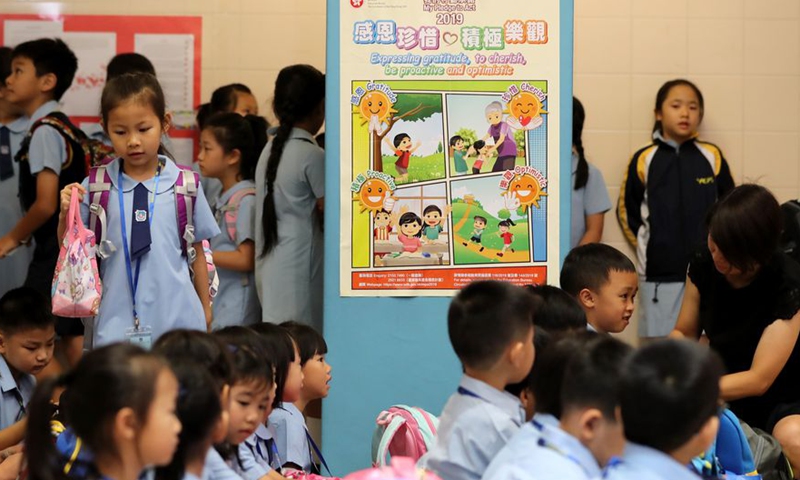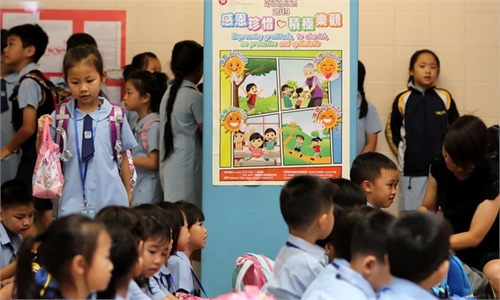HK education bureau stresses continuous improvements for local liberal studies book as Aristo comes under fire

Children attend an event marking the new semester at Yaumati Catholic Primary School in south China's Hong Kong, Sept. 2, 2019.Photo:Xinhua
"Improvements" have been made to the public health section of Hong Kong liberal studies teaching materials published by Aristo Educational Press, which has been criticized for containing obsolete and biased content.
The public health section of the Hong Kong liberal studies teaching materials published by Aristo have recently come under fire for allegedly tarnishing the mainland's image with obsolete and biased content, drawing widespread criticism from the parents of local students.
According to the Hong Kong newspaper Wen Wei Po, parents revealed in chat groups on Sunday that the 2020 Aristo-published liberal studies materials contained groundless accusations against the mainland, such as black market organ trading.
The Aristo books also used cartoon images to exaggerate food security problems in the mainland, with one showing a man fainting after dining in a restaurant. The picture captions food served on table with tags such as "lean meat powdered pork" and "malachite green fish," which the parents saw as obsolete and biased news.
Parents pointed to another image that mocks the country's path to sustainable development as being hindered by acid rain, smog and water pollution, which they say was imbalanced and overlooked the positive measures China has taken.
Commenting on the matter, Wun Siu Lun, an official with the information office under the Education Bureau of the Hong Kong Special Administrative Region (HKSAR) government, responded Tuesday to the Global Times via an email statement by saying that "improvements" had been made to the content of the Aristo published textbooks in question.
Through consultations, the Hong Kong education regulator offered advice for improvements, the statement noted, while explaining that specific revisions to the content, including text and pictures in the teaching materials, would be determined entirely by the publishers.
The Hong Kong education regulator stressed that although such revisions have been made, publishers still bear the responsibility to continue examining and constantly optimize book content to ensure the materials are correct, objective and balanced and in line with teaching goals and principles of the curriculum.
When asked if the bureau would instruct frontline faculty to offer extra guide-lines and illustrations when it comes to similar controversial content, Wun said that the bureau has been constantly elaborating on the requirements and principles to schools through measures such as curriculum guidance, professional training for faculty members and also urging teachers to choose textbooks and teaching materials "with prudence," regardless of what subject it is for.
A total of six publishers and eight textbooks have gone through the consultation, which was conducted by a team of education professionals appointed by the education bureau. The list of the publishers and textbooks has been published on the bureau's website, the Global Times previously learned.
Aristo Educational Press, previously heavily criticized for providing "poisonous information" that favored pro-secessionist groups, was among the publishers that undertook the consultation and made revisions to its textbooks.
Aristo has yet to respond to Global Times request for comments on the matter as of press time.
Former HKSAR government chief executive Tung Chee-hwa said in August 2019, when the city was haunted by riots and social unrest, that it was misleading content in the liberal studies curriculum that caused widespread misunderstanding and even hostility to the Chinese mainland among Hong Kong youths, and such content had also led to confusion in their awareness of their identity.
Netizens commented on the resurgence of controversial content carried in the city's liberal studies book, with many saying that "there will be no correct and objective view and understanding of the mainland if the publisher keeps on instilling only negative and biased old images of the mainland."
Some even suggested that Hong Kong might as well use the universal teaching materials for mainland students published by the People's Education Press.


